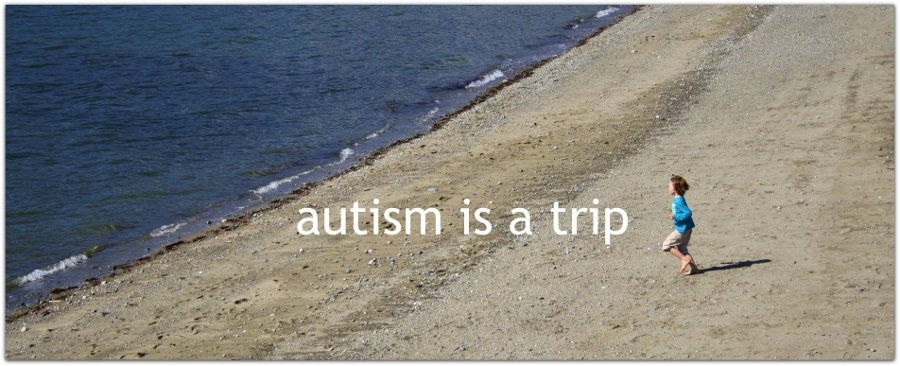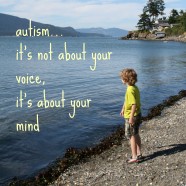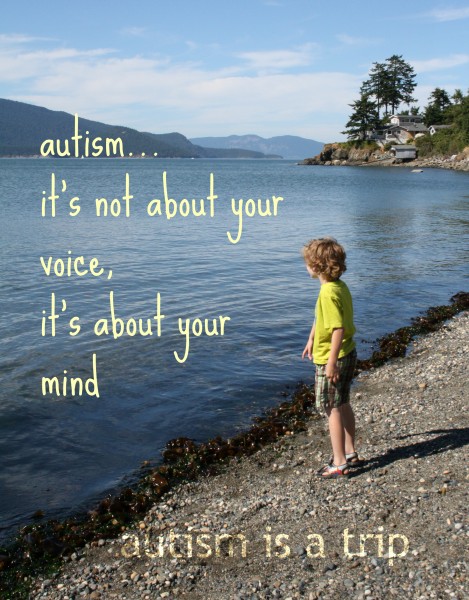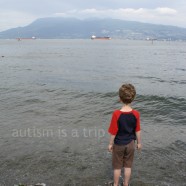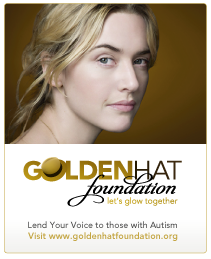Autism: Don’t Ask, Don’t Tell?
I am very fortunate to have a vocal readership. I receive a lot of comments, messages, and emails via my Facebook page, here, and on redOrbit. Some are of the “me, too!” variety, many are requesting advice, others are autism parents reaching out to an understanding ear.
Then there are the rest. The criticisms, the angry voices opposed to what I’m saying, the ones I’m just not sure about. The ones that make me shake my head and say “wtf?”
Yes, I actually say “wtf.” Clearly, I’m a fourteen-year-old girl trapped in this forty-something brain.
Normally I shrug them off. Occasionally I address them, when I feel like the writer is completely out of line or misconstrued my intent. More often I simply thank them for taking the time to read my work. It’s always nice to be read, whether or not it’s appreciated.
This week I received an email, in response to this post, that not only got my attention, it really got my ire up. Instead of merely ignoring or answering the email, I thought it would be better played out here, where I can share it with a wider audience. I honestly believe this is a subject that should be talked about.
Loudly.
Here is the email I received:
Dear Wendy,
I am assuming your story ‘Dear Son, You Have Autism‘ is real.
I believe you should not label your son as autistic, definitely do not tell him about. He looks to me, based on your story, as quite normal.
Our understanding of psychology and the underlying chemistry is yet in the infancy.
We are ignoring the negative effects which the ‘modern ‘labelling’ may have on self esteem and confidence of children and young people. I am in fact terrified seeing how easily Educators and Psychologists (in fact ignorant in Chemistry, Biology, Medicine and many other relevant Sciences) are labelling our kids with the whole spectrum of disorders.
This also happened almost 40 years ago to my son, labelled (sic) as hypersensitive, almost abnormal – the label ‘autistic’ has (sic) not been yet in use.
He finished his tertiary education brilliantly, and is since years an IT expert co-working with a team of researchers on mysteries of our brain.
SXXXXX
ps. I worked my whole life as an academic, educator and researcher and remain very critical of many of the modern classification – labelling (sic) methodologies. In particular terrifying is that these people are ignoring huge probability of being wrong.
So many things to say here. Where should I begin? I think I’ll go through it line by line.
I am assuming your story ‘Dear Son, You Have Autism’ is real.
If you had taken the time to look at my website, you’d see that yes, in fact, our story is indeed true. I don’t write fiction.
I believe you should not label your son as autistic, definitely do not tell him about. He looks to me, based on your story, as quite normal.
Tell me, how, exactly, does an autistic individual look? I’m guessing you don’t look ignorant, yet here we are.
What’s in a label? You call yourself an “academic,” and that’s a label. Some labels are pretty awesome. “Nobel Prize Winner.” “President.” “Canadian.” Why not call a spade a spade?
The larger issue here is the statement that my son looks, to you, “quite normal.” What, pray tell, is “normal?” Should I tell my son that since he can “pass” as normal, that he ought to? That he must hide his true identity, like the Jews in WWII, light-skinned blacks in the 1950’s and 1960’s and gay teenagers today?
That opinion puts you in pretty bad company. To insist that my child pretend he is something that he is not for your comfort or your ignorance or his safety makes you no better than the Klan in my book.
Harsh words, yes, but so is telling me to hide my child’s true self.
I have no more intention of keeping Jack’s autism from him than I have of keeping his place of birth or Scottish ancestory a secret.
Jack was born in Indianapolis. He is a direct descendent of William Wallace. And he has autism.
To say that my son should hide his autism like something to be ashamed of is absurd, ignorant, and discriminatory.
And I will not do it.
Our understanding of psychology and the underlying chemistry is yet in the infancy.
We are ignoring the negative effects which the ‘modern ‘labelling’ (sic) may have on self esteem and confidence of children and young people. I am in fact terrified seeing how easily Educators and Psychologists (in fact ignorant in Chemistry, Biology, Medicine and many other relevant Sciences) are labelling (sic) our kids with the whole spectrum of disorders.
This is true. It would also appear that you do not have a firm grasp on it yourself, or you would understand that a neurological variance such as autism is not something to be “terrified” of. Your statement that telling autistics that they are, in fact, autistic, will crush their self esteem and confidence is the exact reason we should. The opinion that someone with a difference should think of themselves as “less than” is antiquated at the very least.
What is that telling my son? That he should be ashamed of who he is? That he should wonder for the rest of his life why he doesn’t seem to think the same way as his peers? Why, when telling him the truth will set him free of wonder and worry?
I want my son, and all people with autism, to be proud of themselves. To be confident. To know that there are people out there, like yourself, who fear what they do not know and understand. Autistic individuals face enough difficulty and hardships in their daily lives, they shouldn’t have to add shame and fear to the mix.
We have evolved as a people. We are better than that.
This also happened almost 40 years ago to my son, labelled (sic) as hypersensitive, almost abnormal – the label ‘autistic’ has not been yet in use.
He finished his tertiary education brilliantly, and is since years an IT expert co-working with a team of researchers on mysteries of our brain.
At this point I would like to point out that you appear to have autism and ADHD/ADD conflated. Autism as a term has been around since the early 1900’s, and ADHD/ADD are not spectrum disorders. I am around the same age as your son, and I, too, was diagnosed (not “labeled”) with hyperkinesis, or being “hypersensitive” as a young child. I am not ashamed of it, nor do I believe it was an incorrect diagnosis.
You also seem to be assuming that we have not had our child assessed and diagnosed with professionals who know anything about biology, chemistry, medicine or neuroscience. You claim to be an academic, yet how much of these do you know? My child has been seen and assessed my no less than twenty professionals, including specialists in brain function, speech and early speech acquisition, sensory processing disorders (including fine and gross motor function), psychiatry, and numerous other disciplines.
They all agree: my child is incredibly intelligent, and definitely autistic.
I am pleased that your son finished his education brilliantly, yet saddened by the sense that you feel the need to justify him. He did not accomplish what he’s done in spite of who he is. He has triumphed because of who he is.
And that, my friend, is no less than what I want for my son.
So, I end this on a lighter note than when I began. I beseech you to keep your mind open to differences, and understand that children like mine may very well be the future.
Certainly, hiding in shadows and telling lies is no way to live anymore. History has told that story time and again.
I will leave you with the statement my son Jack has about having autism. This is his story, after all.
“Autism is not about your voice. It’s about your mind.”
And that’s all we have to say about that.
A version of this post originally appeared on redOrbit blogs.
Share this: Twitter | StumbleUpon | Facebook | digg | reddit | eMail Read MoreBe A Friend: What to Do When A Child You Know is Diagnosed
Among family and those I consider close friends (people I have real, off-the-computer relationships with), more than thirty of their children are either on the autism spectrum, suspected of being on it, or have associated behaviours (ADHD, etc). In the last month alone, two dear friends have had a child diagnosed with autism.
Autism is everywhere, and that’s all right. Learning a child actually has autism, however, can be quite a shock.
We suspected Jack had at least a sensory processing disorder, and were actually hoping for an official autism diagnosis. With a diagnosis comes support and interventions.
When the psychiatrist at his evaluation actually suggested autism, though, it was an ice cold smack in the face.
Sometimes, even when you know your child is autistic, it hurts to hear it out loud.
Hearing the words, seeing the actual reports and assessments in your hands… somehow changes the game. You’re no longer on the sidelines, rather, you’re suddenly center field with the ball in your hands. Game on.
So now what?
As the saying goes, there is no rest for the weary. Parents of a newly diagnosed child are suddenly inundated with action plans, financial concerns, and their own, often conflicted, emotions.
And people who want to help. Lots and lots of well-intentioned people.
Parents of autistics are often overwhelmed with good intentions that are not always constructive. Some actually hurt. I doubt most of these folks even realize what they’re doing.
So, I came up with a few suggestions.
Things you should not say or do to a parent with a newly diagnosed child:
1) Express sorrow and/or pity.
The child has not died, and has not been diagnosed with a terminal illness. Autism is a life-long condition, but it’s not a death sentence. Please don’t act as if it is. Sympathy is good, pity is not.
2) Immediately suggest a diet/test/protocol.
Every person with autism is different, and not all respond in the same manner to the same things. The family will likely explore all of their options to find out what will work best for their child.
3) Start forwarding them every single article/email/meme/book that mentions the word autism.
They have just entered this world, and need some time to adjust. Drowning them in autism stories only complicates the situation.
4) Ask what they think caused the child’s autism.
To date, nobody knows what causes autism. There are a multitude of theories, but no concrete evidence, anywhere. Some studies point to genetics, some point to environmental influences, but none have a conclusive answer. Parents do nothing to “cause” their child’s autism, and asking this question passively-aggressively implies they did.
5) Share horror stories.
This is similar to scaring a first-time mom with horrible birth stories. Yes, autistic children wander, are abused in schools, and are open to any number of other terrible things. Just as you shouldn’t talk about how many babies die in a particular form of childbirth to a pregnant mother, don’t start listing off every bad thing that has happened to every autistic child ever. Just don’t.
6) If you’re a parent of an autistic child yourself, don’t smother them with “assistance.”
When the family is ready, they’ll reach out. Think about when your child was first diagnosed, and how you felt. Treat them the same way you wanted to be treated.
Instead, here are some things you definitely can and should do for someone with a newly diagnosed child:
1) Offer words of support.
Instead of an “I’m sorry,” give love and friendship. An “I’m here for you” goes a long way.
2) Wait until you’re asked to give advice/suggestions/help.
Stand back, give them some room to breathe. If you let them know you’re there whenever needed, they’ll come to you. And if they don’t, that’s all right, too. Don’t be offended.
3) If you’re an autism parent (or autistic) yourself, wait until you’re asked to share stories.
I know it’s tempting to share your tales of success and failures in various areas, but there will be plenty of time for that down the line.
4) Stay positive.
But don’t pander. Parents don’t need to hear that “at least” it’s high functioning autism or that s/he can speak, or anything else that minimizes the situation. It’s condescending and unnecessary. Instead, compliment the child. The child is the same today as s/he was before the diagnosis.
5) Ask “how can I help?”
Parents new to autism need some time to process what’s happening with them and their child. Take them a meal, watch their other children for a bit, or simply ask to help with laundry or other household chores. A little gesture or respite goes a long way.
6) Be a friend.
This one should be self-explanatory. Be there when they need you. Lend an ear or a shoulder. Give unconditional love. Autism can be a very isolating thing for everyone involved – knowing there are people to turn to is immeasurable.
Support is the number one thing families of autistics want and need. In any way, large or small, it all helps.
A version of this post originally appeared on redOrbit blogs.
Share this: Twitter | StumbleUpon | Facebook | digg | reddit | eMail Read MoreWhy Didn’t Mikaela Lynch Get an Amber Alert?
I also blog over at redOrbit.com, and this was my other post as part of “An Outpouring of Love for The Mikaela Lynch Family.” To read more entries from other writers, please visit this site. You can see the original post here. Sadly, several more autistic children have drowned since I wrote this article not two weeks ago.
******************************************************************************************
There is a question many are asking in the wake of Mikaela Lynch‘s disappearance in Clearwater, CA last week. Actually, there are a lot of questions being asked by a lot of people, but there is one that I, and many in the autism community, would really like an answer to.
Why was there no Amber Alert for this missing nine-year-old girl?
It’s important to understand that not all missing children get an Amber Alert issued for them. In order to “qualify,” missing children must fit certain criteria. Primarily, the family must be able to prove the child was abducted, and preferably give a description of the abductor and/or their vehicle.
A missing autistic child does not fit the criteria for an Amber Alert, yet the dangers are just as real and just as imminent as for one who has been abducted.
Over half of all autistic children are “runners”: children who, given the chance or the right circumstances, will simply go. Take off. Run. Sometimes there is a destination, oftentimes there is not. My child runs when he doesn’t want to leave somewhere or when he’s off in “his world,” as we call it. He gives us very few clues as to where and when it might happen, so we are always wary. It doesn’t happen very often with him, but many autistic children are continuous flight risks, meaning their families are on high alert at all times, day and night. Their houses are fortresses of locks and gates and barriers and alarms.
Another curious thing about autistic children? They’re fast. Faster than you’d ever think, and highly trained in the arts of evasion. If an autistic child wants to run and you’re not ready for it, there’s not a whole lot you can do other than hope you can run faster. Or hope there’s someone on the other end who can run interference. A lot depends on hope.
Mikaela was nonverbal. She could not speak, nor really understand the world around her past the cognizance level of a very young toddler. Mikaela was also not toilet trained. That’s not unusual for children on certain parts of the autism spectrum, nor is it a surprise to anyone who has an autistic family member or knowledge of autism. Autism parents talk about speech competence and toilet habits in the same breath. It’s just another part of life. And no, it doesn’t matter if she was or was not able to use the toilet herself, but it speaks to her vulnerability. It’s not newsworthy in any kind of sensational way.
Autistic children are barraged with sensory input, and are equally drawn to things that stand out to them. Mikaela, like many children, loved water. Given the chance, she went to the water. Mikaela had sensory issues with her clothing – typical among individuals on the spectrum – and liked to shed it when she was hot. Within minutes of leaving her home, she was naked. A naked nine-year-old girl, running down the street, headed for water.
I cannot imagine putting a child in a more vulnerable situation.
Knowing these things about Mikaela, it becomes a little easier to see why she may have taken off in such a hurried manner. How often do parents find themselves chasing toddlers who have run off after a butterfly or a car or a cloud? Who strip naked at the drop of a hat? Small children are amazed with the world, and they want to embrace it. Individuals with autism experience the world much in the same way. To them, everything is bigger and louder and brighter and more extreme (this is an excellent video that attempts to replicate how an autistic person experiences their environment).
Autistic children with a high-risk of eloping (running) can be fitted with a tracking anklet or GPS tracking device in their school bag (there are bracelets and watches, too, but those can be torn off by an extremely sensitive individual). There is an endless array of identification items for autistic children, everything from temporary tattoos to shoe ID tags. We’ve even resorted to writing our phone number on Jack’s upper arm where he can’t rub it off.
The majority of us in the autism community don’t need to ask what security measures Mikaela’s parents had in place to keep her contained and out of harm’s way. We can safely assume, knowing her abilities and cognizance level, that they had multiple precautions in place: locks, gates, constant supervision, etc. As will happen in the best of circumstances, life intervened. An unexpected chain of events led to Makaela being unsupervised for a moment. A moment she seized. A moment her family will never forget.
There is no one to blame for Mikaela taking her chance to run, nobody to fault. There is simply no way to keep a nine-year-old child under total surveillance without locking them away in a room. Things happen, life happens, tragedy happens.
It’s what happens next that’s important. Mikaela’s family was just minutes behind her, and called the police quickly. Hundreds of law enforcement and concerned citizens joined in the search. But because Mikaela was not abducted, there was no Amber Alert.
Perhaps they make a good point in narrowing the field of children to abductees, so that people don’t get desensitized to the alerts. The good they do, though, cann0t be denied. Amber Alerts go out over the radio, the television, Twitter feeds, text messages, email, up on SigAlert signs on highways, and more. Information about the missing child is spread far and wide within a very short span of time, and it has been proven to work, time and again.
Autistic children deserve that same attention. Mikaela was, sadly, not the first autistic child lost to drowning this year. Or even this month. She is, in fact, one of three children who have drowned in the last week alone.
Drowning is the leading cause of death for autistic children under the age of 14, and not by a small margin, either. 91%.
I can’t help but think that if an Amber Alert had been issued for Mikaela, perhaps someone may have taken a closer look at the child in the street. Or joined in the search. Or come forward with information they didn’t realize was relevant.
We can’t beat ourselves up for what might have been, but we can change the future for autistic children. If we can’t give them an Amber Alert, perhaps we need a new alert. One specifically for vulnerable autistic individuals. The family of Amber Hagerman, another nine-year-old who went missing, paved the way for the Amber Alert. As a result, countless children are alive today. Our children deserve the same attention, the same urgency, the same rapid dissemination of information.
We need an Autism Alert, and we need it now. We can’t spare any more of our very special babies.
To learn more about what you can do to help prevent wandering incidents and deaths within the autism community, please visit The AWAARE Collaboration.
This post is part of “An Outpouring of Love for The Mikaela Lynch Family.” To read other entries, please visit this site.
Share this: Twitter | StumbleUpon | Facebook | digg | reddit | eMail Read More